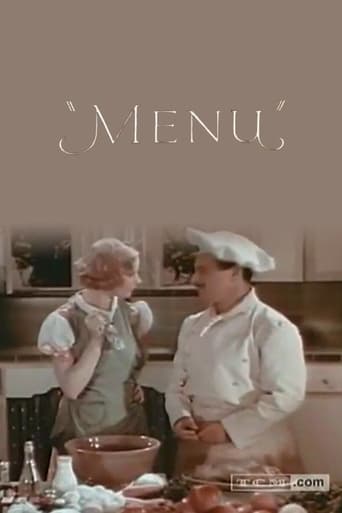

This very slight MGM comedy short from 1933 isn't particularly funny, but it received an Oscar nomination for "Best Short Subject" that year, and it has the wonderful UNA MERKEL in her physical prime in TECHNICOLOR! (She would not appear in a color feature film until the early '50's MGM remake of "The Merry Widow" starring Lana Turner.) I'd give "Menu" a "10" if it had more of Merkel, but as it stands, it's worthy of an "8" for a Technicolor Una Merkel alone. Merkel was one of the great supporting players of the Hollywood studio era, and one of its most prolific, appearing in about three dozen feature films, primarily for MGM and Warner Brothers from 1931 to 1934. "Menu" is an early example of the three-strip Technicolor process that would not be used in feature films until 1935's "Becky Sharp" with Miriam Hopkins. Up until that point, it was reserved for short films, but usually musical shorts, unlike this simple "Pete Smith" MGM comedy short, most of which were shot in plain B&W. Una Merkel, with her strawberry blonde hair, blue eyes and pale pink complexion, was a feast for the eyes in the then "new" Technicolor process, and is the primary reason to see this film.
... View MoreMenu (1933) ** (out of 4) Technicolor short from MGM has Pete Smith teaching women how to cook a duck that won't make their husbands sick. I've seen quite a few of these Smith educational shorts and while most of them are entertaining the same can't be said for this one. Even at nine minutes this thing goes on too long and none of the comedy in the film works.You can find this short playing on TCM quite often and Warner has released it on their Katharine Hepburn set. This is one of the weaker Smith shorts but they all have a certain quality.
... View MoreI love these little "one reel wonders" that TCM throws in at the end of their regularly scheduled movies as filler till the next movie comes on. I caught this one at the end of Sunrise, during TCM's 31 Days of Oscar. Seems this little 1933 one-reeler was nominated for Best Short Subject.It's very amusing. An early technicolor about a man with indigestion, thanks to a wife who's a klutzenheimer in the kitchen. Una Merkel plays the dippy wife -- she utters about 3 words but is told by the unseen narrator that he's the only one allowed to talk! The narrator acts as an omnipotent overseer, putting broken eggs and spilled condiments back together again by the magic of reverse-action filming. He also brings in a chef in a puff of smoke, to come to the housewife's rescue. We are then treated to a mini-cooking show, with instructions on how to prepare stuffed duck and baked apples. It's quite droll, with the narrator getting off such funny zingers as: "Cook the stuffing for 15 minutes, for that perfect taste that you love to burp up later." "Now clutch the apple firmly so it will realize the futility of any resistance." Very funny and amusing. Too bad there's no way to actually know when this will be on again. I don't think TCM lists its one-reel wonders in its programming guide, which is too bad. Well, if you run across "The Menu" at the end of your regularly scheduled program, be sure to stick around and watch it. I think you'll enjoy it!
... View MoreAn MGM PETE SMITH Short Subject.A very silly housewife receives help with her dinner MENU - and a cure for her hubby's upset tummy - when a chef magically arrives in her kitchen.This fanciful little film is an enjoyable bit of early Technicolor fluff. The practical demonstrations, mixed up with the gentle humor, serve up a most pleasing result - almost as appetizing as the roast duck & baked apples. Movie mavens will recognize Franklin Pangborn as the dyspeptic husband, Una Merkel as his featherbrained wife, and Luis Alberni as the remarkable chef, all uncredited.Off-the-wall narrator Pete Smith would produce a reworked version of this story - with Oscar winning results - four years later in PENNY WISDOM (1937).Often overlooked or neglected today, the one and two-reel short subjects were useful to the Studios as important training grounds for new or burgeoning talents, both in front & behind the camera. The dynamics for creating a successful short subject was completely different from that of a feature length film, something akin to writing a topnotch short story rather than a novel. Economical to produce in terms of both budget & schedule and capable of portraying a wide range of material, short subjects were the perfect complement to the Studios' feature films.
... View More